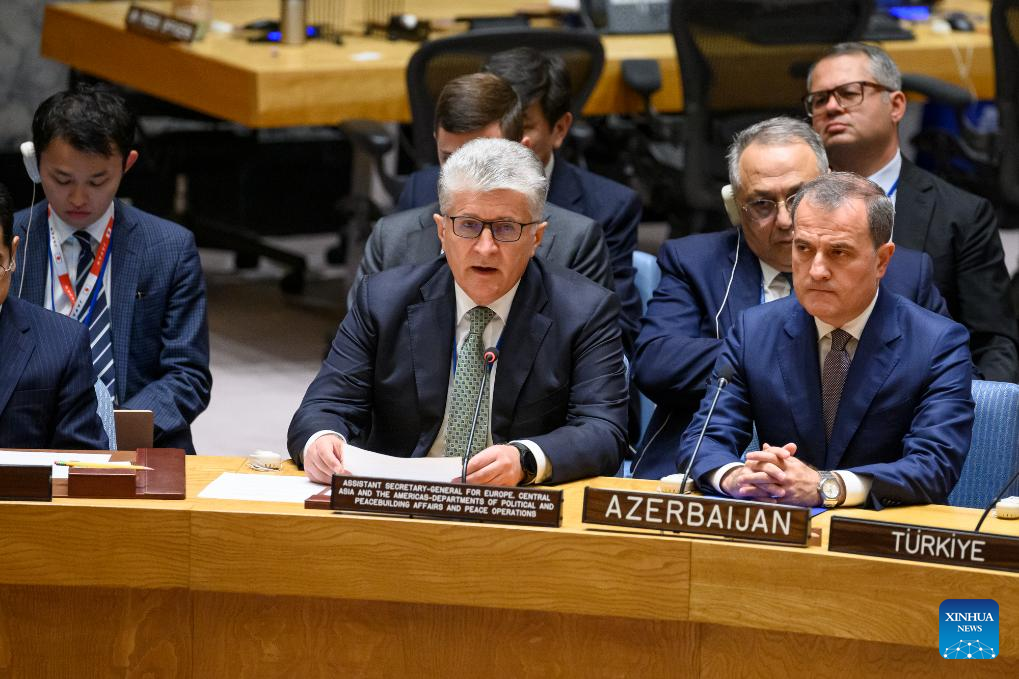
Miroslav Jenca (C), UN assistant secretary-general for Europe, Central Asia and the Americas, speaks at a Security Council meeting at UN Headquarters in New York on Sept. 21, 2023. The United Nations on Thursday called for a durable cessation of hostilities between Azerbaijan and Armenia following the latest escalation in the disputed Nagorno-Karabakh region. (Loey Felipe/UN Photo/Handout via Xinhua)
UNITED NATIONS, Sept. 21 (Xinhua) -- The United Nations on Thursday called for a durable cessation of hostilities between Azerbaijan and Armenia following the latest escalation in the disputed Nagorno-Karabakh region.
"We call for a credible and durable cessation of all hostilities. Any renewed escalation would lead to further loss of life and human suffering and further set back internationally supported peace efforts," said Miroslav Jenca, UN assistant secretary-general for Europe, Central Asia and the Americas.
The protection and essential needs of the civilian population, including their human rights, must be the overriding priority. A genuine dialogue between the government of Azerbaijan and representatives of the region, together with full engagement in the normalization process by Armenia and Azerbaijan, is the only sustainable way forward, he told the Security Council in a briefing.
The UN Secretariat will remain in close contact with all relevant actors and the concerned parties and stands ready to support ongoing peace efforts, as needed. The secretariat is also ready and prepared to conduct humanitarian needs assessments, if given access, and provide assistance as needed, he said.
Azerbaijan announced Tuesday that it had launched "local counter-terrorism activities in the Karabakh economic region" in response to the deaths of two civilians and four police officers in incidents involving landmines, allegedly placed by Armenian armed forces, said Jenca.
According to official statements, Azerbaijan had informed the Russian peacekeeping force and the Joint Russian-Turkish Monitoring Center of its activities as intended to prevent large-scale provocations by the Armenian armed forces, neutralize their military infrastructure, and ensure their withdrawal and the restoration of the constitutional order of the Republic of Azerbaijan, he said.
Developments indicated a serious escalation in military operations with reports of Azerbaijani forces breaking through the Line of Contact. There were casualties reported, including among the civilian population as well as evacuations of some thousands of people within the region. The Russian peacekeeping force, which itself suffered casualties, documented numerous cease-fire violations, said Jenca.
The United Nations, which is neither present along the Line of Contact, nor in other areas under the mandate of the Russian peacekeepers, is not in a position to verify or confirm these various claims and allegations, he said.
The developments of the past few days should be seen in the context of the broader pattern of regular cease-fire violations which have continued to persist. The world body, however, noted Wednesday's announcement of a cessation of hostilities, with the situation on the ground remaining fluid, he said. "We also understand that, in a positive step, representatives of the local population and the government of Azerbaijan met earlier today for an initial exchange."
Armenia and Azerbaijan have been at loggerheads over the mountainous region of Nagorno-Karabakh since 1988. Peace talks have been held since 1994, when a cease-fire was agreed on, but there have been sporadic minor clashes since then. A new round of major armed conflict broke out along the contact line on Sept. 27, 2020, before Russia brokered a new cease-fire agreement on Nov. 9, 2020. Tensions have remained since. ■



